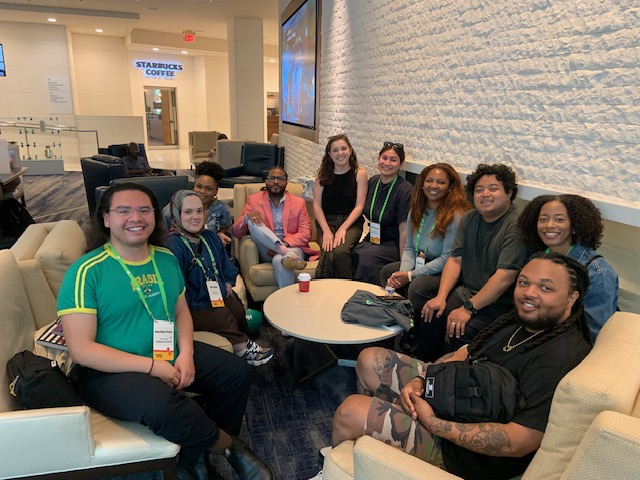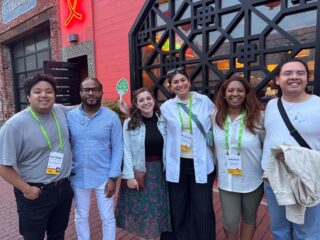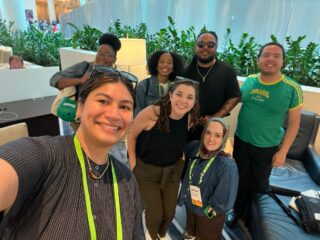Transportation Justice Fellows Reflect On Their Commitment to Transportation Equity
by Odochi Akwani, Writer and Content Manager
June 26, 2025
Members of this year’s Transportation Justice Fellowship share their experiences participating in the program.

The Better Bike Share Partnership (BBSP) celebrated the conclusion of its 2024-2025 Transportation Justice Fellowship program earlier this month with a ceremony recognizing this year’s cohort of 11 transportation professionals.
Congratulations to all our 2024-2025 Transportation Justice Fellows for completing the program!
The Fellowship, launched in 2021 and led by the National Association of City Transportation Officials (NACTO), provides professional development and networking opportunities to help early- to mid-career professionals embed mobility justice in the transportation sector.
The 2024-2025 Fellowship launched last November, focused on shared micromobility as a critical tool for expanding the reach of public transportation, operationalizing equity, and building transportation justice. During their time in the fellowship, fellows met regularly with NACTO, BBSP, and Robin Wright-Pierce and Nelson Pierce, Jr. from Transforming Change for skills-building sessions, one-on-one coaching, special trainer visits, and structured collaboration.
All 11 Transportation Justice Fellows attended this year’s Designing Cities Conference in Washington, D.C. During the annual BBSP Shared Micromobility Roundtable, fellows presented their group research projects. Read our last story, A Look Back at NACTO Designing Cities 2025 in Washington, D.C., for a summary of their projects.


Several peer sessions featured fellows as panelists or moderators. Rachel Brown moderated the peer session titled “Convincing the Masses to Make Mass Transit Better,” Brother Lloyd Cheatom spoke on a panel during the session “Confessions of a Shared Mobility Planner,” Jeremiah Franklin participated as a panelist in “Responsive, Not Reactive: Managing Constituent Requests and Expectations,” and Diana Voss-Gonzalez was a panelist for “Your Bus Stop Called–It Wants an Upgrade!”
At our closing ceremony on June 12 to conclude the fellowship, BBSP, Transforming Change, Transportation Justice Fellowship alumni, and the fellows’ coaches shared their reflections on the fellows’ achievements and growth.
“Anyone in their career, whether you’re early, middle, or later — you have something to offer,” said Fellowship coach Paul Supawanich, director of programs at Global Designing Cities Initiative. “The transportation industry doesn’t necessarily give space like this fellowship does to discuss these topics.”
Fellows also shared their journeys from the beginning to the end of the fellowship, speaking to how they’ve developed personally, as transportation professionals, and as BIPOC individuals working toward transportation justice.
Read on for insights from six of the fellows about their experiences in the program.
Reflections From the Fellows:
WHAT WERE YOUR FAVORITE MOMENT(S) FROM THE #NACTO2025 DESIGNING CITIES CONFERENCE?
“The conference facilitated meaningful interactions with professionals across the transportation sector. Exchanging ideas and experiences with peers deepened my understanding of the challenges and innovations in the field, fostering a sense of community and shared purpose. These experiences have not only expanded my knowledge but also inspired me to advocate for and implement equitable transportation solutions in my own work.”
– Jeremiah Franklin
“Two key highlights stood out for me: connecting with transportation professionals and colleagues, and hearing firsthand about their innovations and the purpose behind our shared work. It was a powerful reminder that we’re united by a shared vision to create inclusive shared mobility spaces. Additionally, meeting the TJ fellows in person was especially meaningful — it allowed us to bond through our professions, shared goals, and the communities they represent and lead in this important work.”
WHAT WERE YOUR MAJOR TAKEAWAYS FROM THE BBSP ROUNDTABLE?
“The BBSP Roundtable affirmed the need to center lived experience and redefine who holds expertise. It also challenged us to think critically about the language we use — what we mean by ‘justice,’ ‘mobility,’ and ‘community’ — and who gets left out when we don’t.”
“Creating bike infrastructure for those with disabilities to be able to thrive in our shared spaces, like bike lanes, requires reconsidering how we allocate space for able and disabled folks who choose to ride or roll, this may mean reducing vehicle lanes. The work required to create safer streets will require authentic partnerships with all kinds of stakeholders, including disabled folks!”
WHAT HAS BEEN YOUR FAVORITE MOMENT FROM THE FELLOWSHIP OVERALL?
“My favorite moment from the fellowship overall was the opportunity to connect deeply with a diverse group of passionate leaders who are all committed to advancing transportation justice. Those moments of genuine dialogue — where personal stories, challenges, and hopes were shared — created a powerful sense of community and solidarity. It was inspiring to see how everyone’s unique experiences and perspectives enriched our collective learning and strengthened our shared commitment to equity. The fellowship wasn’t just about gaining knowledge; it was about building lasting relationships and a supportive network that continues to motivate me in my work. That sense of connection and mutual support has been the most meaningful takeaway for me.”
– Jeremiah Franklin
WHY DO YOU THINK A FELLOWSHIP LIKE THIS IS IMPORTANT?
“The fellowship has been personally and professionally transformative. It provided me with a community to learn from, lean on, and lead alongside. Through this experience, I’ve strengthened my voice as a leader and reaffirmed the values that guide my work. The fellowship equipped me with the technical tools, language, and confidence needed to navigate challenges and drive meaningful change. At a time when the work feels both urgent and overwhelming, this fellowship reminded me that I am not alone—and that lasting impact is possible when we move forward together.”
“I feel It’s important to have spaces outside of the workplace where professionals at a similar stage in their careers can reflect on their work, share wins, and work through challenges together. Transportation justice work can feel isolating, and it’s not always easy to find a community that understands your perspective or where you don’t feel pressured to have all the answers. This fellowship offered that support and made the mental and emotional load of advocacy work feel lighter.”
HOW DO YOU SEE THE FELLOWSHIP HELPING YOU IN YOUR CAREER?
“This fellowship has given me the language, tools, and confidence to show up fully as both a visionary and a practitioner. It’s expanded my professional network and deepened my long-term commitment to equity-driven, community-centered planning.”
“The fellowship helped me gain a better sense of direction in my career aspirations. While I entered this field with transportation justice as my focus, I began to wonder if it would be feasible to maintain that focus as I progress in my career. I’ve since realized that not every project I work on has to be centered on equity in order for me to carry that perspective into my work. I can still be a strong advocate for equitable transportation even within projects that don’t have equity as their main goal.”
WHAT’S THE BIGGEST CHALLENGE OR ISSUE YOU SEE FACING THE TRANSPORTATION AND MOBILITY FIELD CURRENTLY?
“There are many great ideas that are coming from dedicated staff and community members who hope to expand the way we move throughout our cities beyond cars. I think our current political moment makes it difficult to be innovative when bike lanes or non-vehicular modes of transportation are being politicized.”
“The biggest challenge I see is sustaining transportation that is both equitable and accessible, particularly in historically marginalized communities. Although innovation and technology are advancing quickly, these communities are often left behind due to limited engagement and a lack of inclusion in the design and development process, missing the opportunity to truly understand what transportation justice means to them.”
WHAT HAVE YOU LEARNED ABOUT TRANSPORTATION JUSTICE/EQUITY THROUGH THIS FELLOWSHIP?
“This fellowship deepened my understanding of the significant role transportation systems play in shaping our cities. Decisions around transportation have profound consequences — from how people get around and access essential services to who is granted (or denied) the freedom to participate in community life with safety, dignity, and freedom of movement. Through shared decision-making and leadership with community, we can intentionally and meaningfully shift power back to those often excluded from these processes, advancing strong, vibrant, and equitable neighborhoods.”
________________________________________________________________________________________
The Better Bike Share Partnership is funded by The JPB Foundation as a collaboration between the City of Philadelphia, the National Association of City Transportation Officials (NACTO), and the PeopleForBikes Foundation to build equitable and replicable bike share systems. Follow us on LinkedIn, Facebook, Twitter, and Instagram, or sign up for our weekly newsletter.
Have a question or a story idea? Email odochi@peopleforbikes.org.
